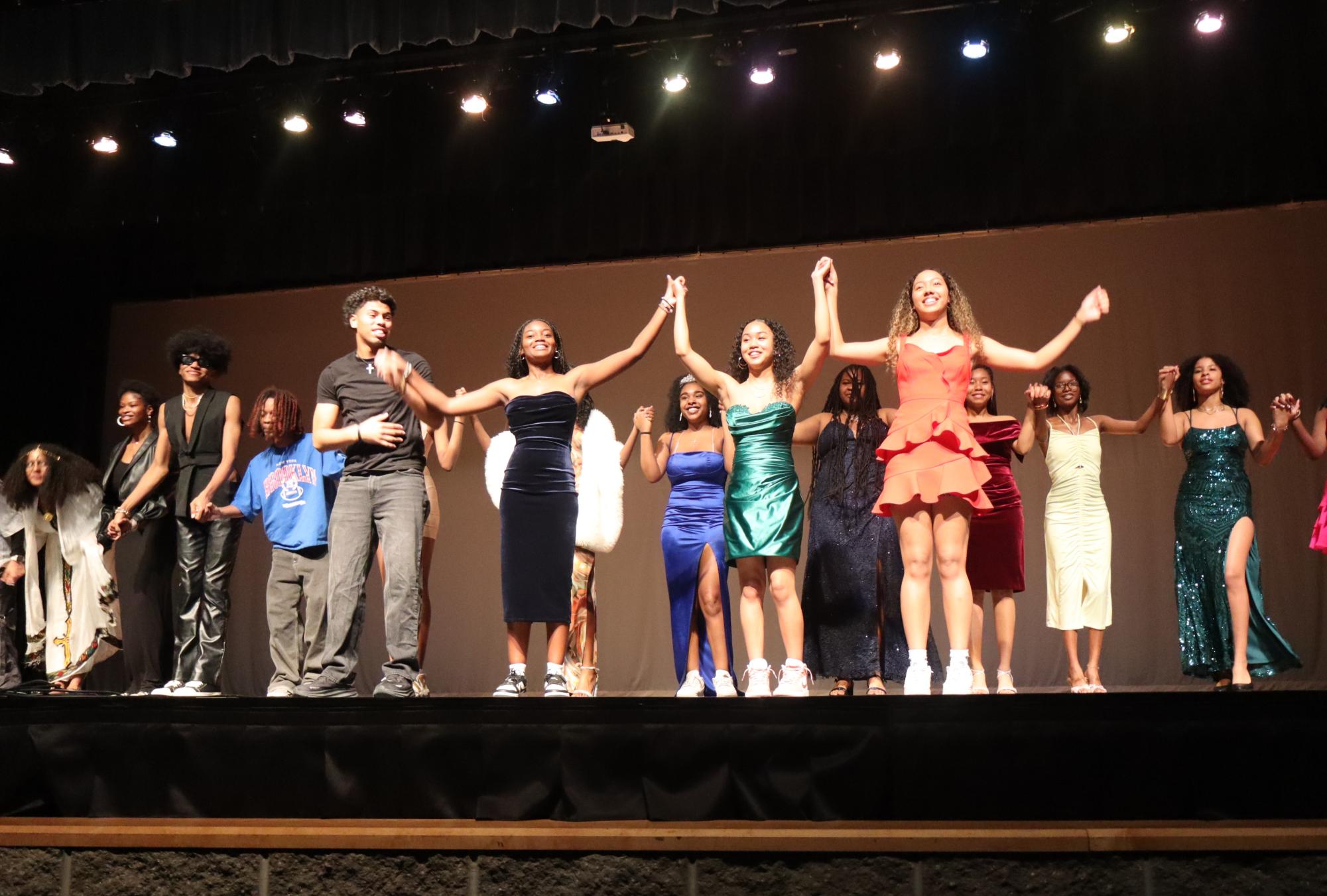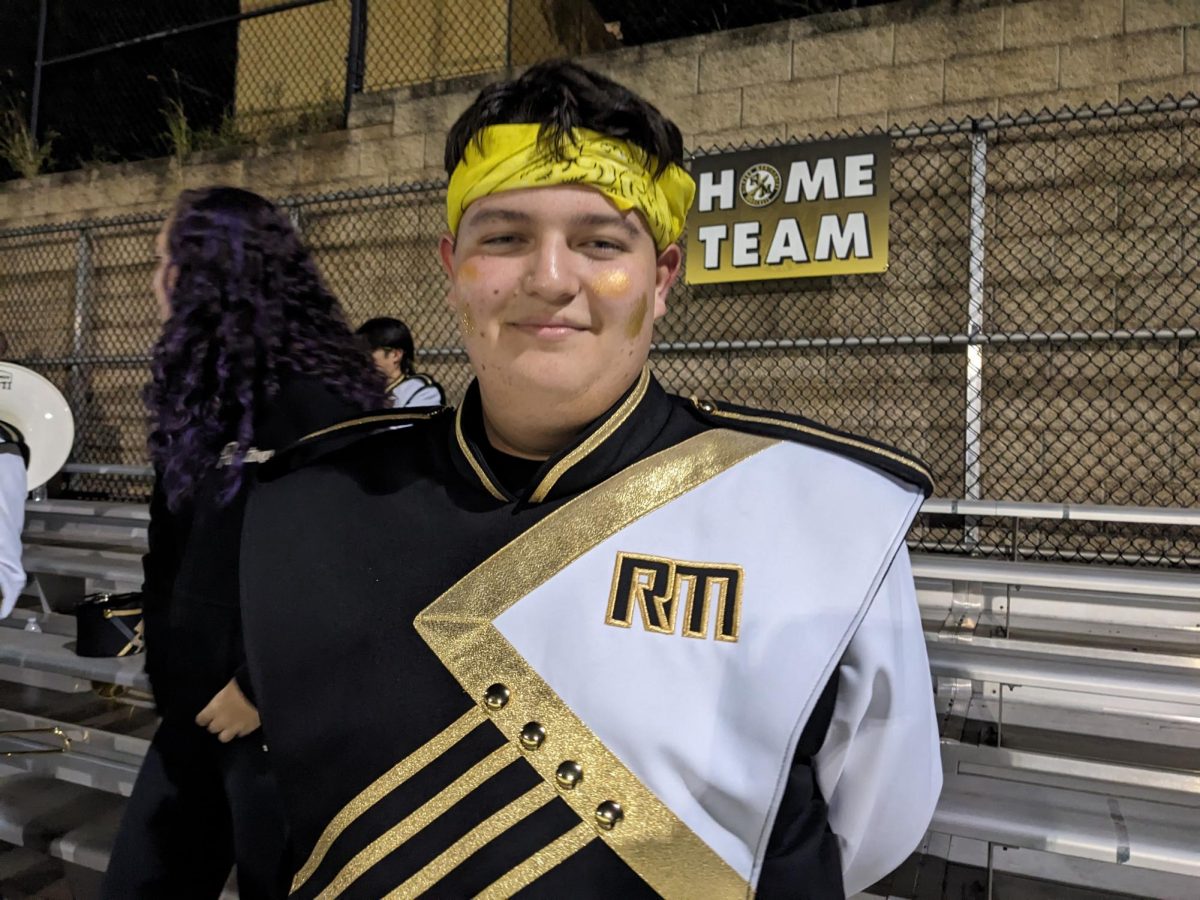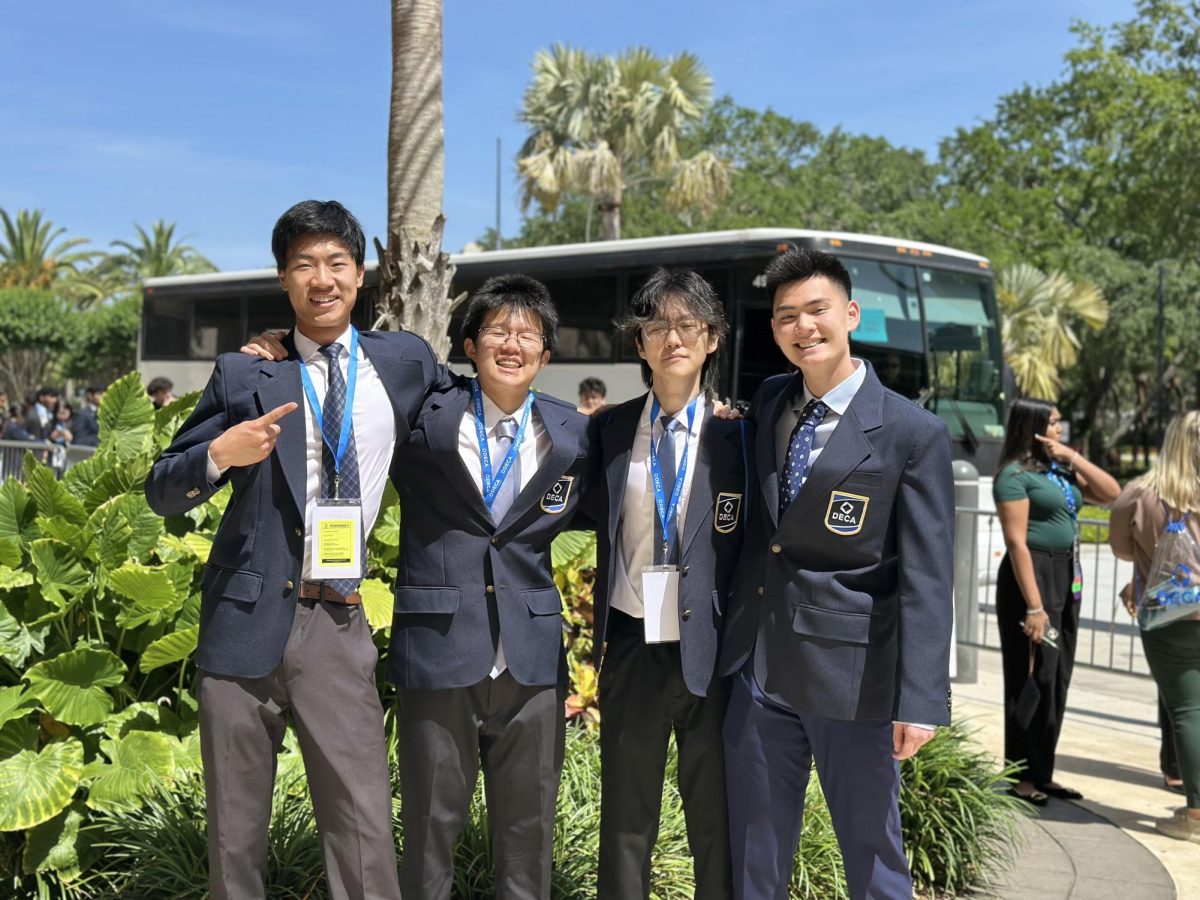RM families gathered in the school for a joyous celebration of the delicious food, flamboyant fashion and creative talent that is Black culture during Black Student Union’s African Diaspora Night Friday, Feb. 21.
BSU began planning for the event a year in advance since the last Diaspora Night had issues with coordination and flow despite stellar student performances. Before the summer even started, a Google Drive folder was created with a setlist, itinerary and logistics planned out. Then vice presidents and current presidents of the club, seniors Corinne Howard and Mara Porter, jump started the process. “Everybody was so amazing, getting on board and adding their ideas onto our ideas, and combining it all just to make one cohesive plan,” Howard said.
Howard joined the club in her freshman year at the RM club fair. “I was walking around and the then president of BSU, Nancy, grabbed me, and she was like, ‘Hey, you’re Black, join our club.’ And I was like, ‘Oh my God, okay. I will,’” she said. “The first few meetings at BSU had standing room only. Freshman year, everybody was in BSU. We played games.” Howard is a member of the IB magnet program, which is predominantly White and Asian, so she says that the union allowed her to interact with fellow Black students. “Going to BSU was a whole different world for me,” she said. “Everybody kind of gets it. When you’re Black, you have a distinct experience, especially in America, and that’s shared by almost every single other Black person.”
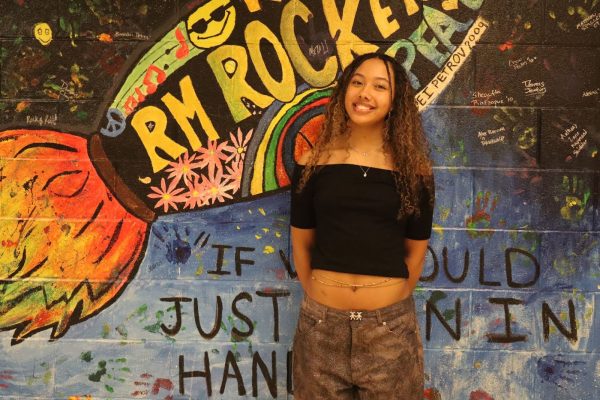
Black history is Howard’s favorite subject which is why she dedicates so much of her time to BSU. “I’m always like, ‘It’s Black History Month, it’s Black History Month!’ and February is also my birth month,” she said. “I really take the opportunity to capitalize on this being a month of remembrance and culture. Especially for BSU this month… every Tuesday of this month, we decided we’re gonna talk about something Black and historical and influential.”
The show was filled with performances interspersed with fashion shows featuring Black clothing ranging from sports jerseys, to baggy jeans, to dashikis. Between acts, Howard provided background and commentary as the MC of the evening. In addition to hosting, Howard helped design the outfits and lent many articles of clothing. She also walked the runway in all the fashion shows herself, frantically running backstage in between curtain closes to change “I’m the youngest so I have a whole bunch of hand-me-downs. I brought almost all the clothes that everybody wore today,” she said. “I was running back there. I was pushing people. I was moving around and I was like, ‘Guys, go. I gotta move.’”
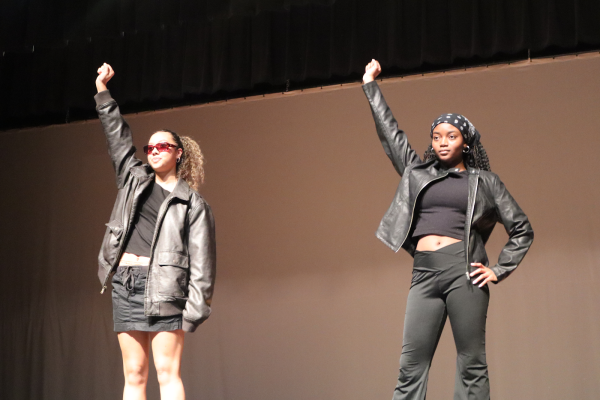
Another performer was sophomore Nehamie Balume who performed the instrumentals of “Blackbird,” a song released in 1968 by the Beatles. “It was the first song I learned on guitar. I just want to share it,” he said.
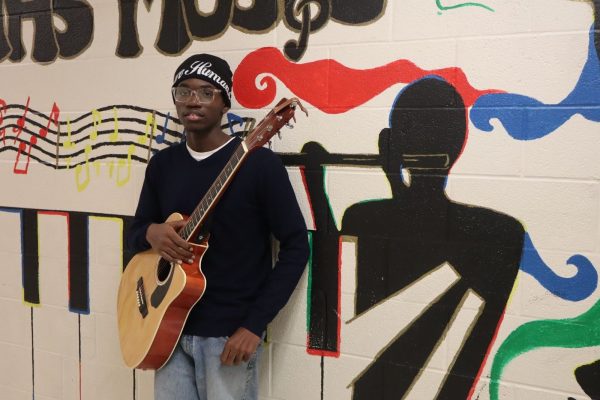
The song was based on the Little Rock Nine, nine Black children who were the first African Amerians to desegregate Little Rock Central High School as well as the experience of Blacks in the Civil Rights Movement in general. “There were those nine selected Black kids who were selected to go to a white school, and they got discriminated against. Parents came out, protested against it. They got stuff thrown at them,” Balume said. “That just shows how bad our country was back then. But it also shows how far we’ve come from that time.”
Balume has been playing guitar now for three years. “I’ve always liked instrumental music and so when my father bought me a guitar, I just said, ‘Let me learn something. I want to make my own music,’” he said. “I think it’s important to remember where we come from, the hardships we went through, and to advocate, because there’s still racial stuff out there in the world. People are still getting discriminated against, but little by little we’re gonna get to where we’re at peace.”
Another performer was senior Naomi Kiawu who recited a poem she wrote in sophomore year, based on the style of Native American poet Joy Harjo. “It is a summary of what Black women have to go through. I talked about how they’re overlooked, how they’re forced to put on a brave face when things are going bad,” she said. “I also have some historical references, like slavery in the 1800s and comparisons from customs from today to back then… We need to look back on what has happened, both bad and good, because it’s important to help us see what we’ve overcome.”
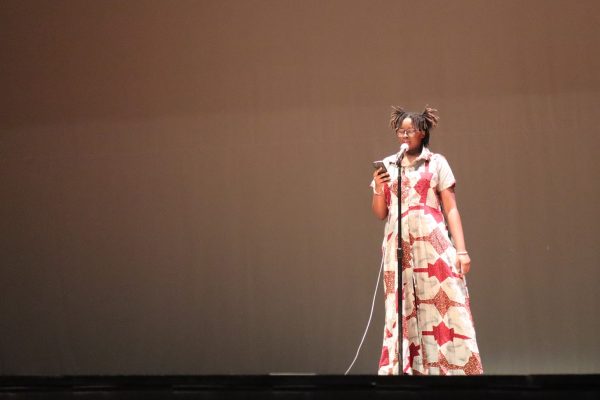
She wore a traditional outfit during her reading. “My mom got it made for me in Sierra Leone about two years ago… I asked her for something subtle, the colors are very pale. I like it a lot because it’s very flowy. It’s a dress, but it’s buttoned up, so if I want to I can wear something under it and take it off.” she said.
Founder, president of African Student Union and senior Liyema Bomvu delivered a self-written speech. “I wrote a speech about Africa, and it was just a speech to talk about Africa and spread awareness… I wrote it a few days ago, and it was in my room,” she said.
She also performed a dance with other ASU members. “We performed a dance and I performed a speech… It was mostly Afrobeats and some amapiano movements… It’s a dance where you mostly focus on your legs and your hips and your shoulders too, a little bit,” she said. “We started practicing only a week before the actual event, this Monday, the same week because we practiced a lot. We stayed after school every single day until today to practice.”
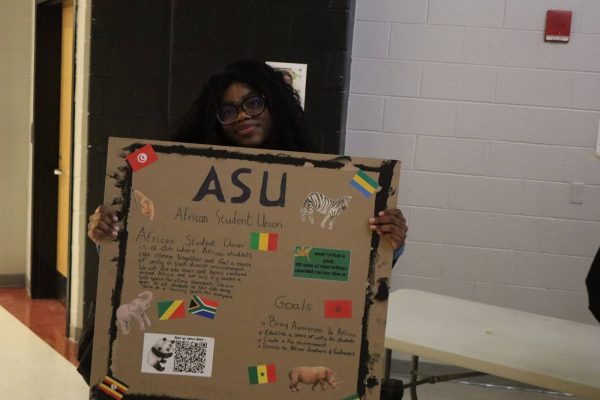
After the show in the auditorium concluded, the audience took a walk through main street where there was a trail of informational trifolds, tables and posters honoring important Black figures and cultural facts. The next stop was the cafeteria where there was a dinner featuring a grand banquet of rich African food. “My favorite food was the dish that I bought, which is Mikate from the Republic of Congo and DRC.”
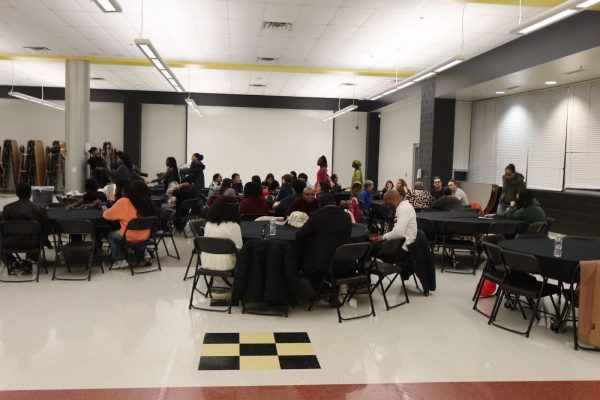
Howard did not bring any food, but she shared a traditional recipe with her friend to bake for the event. “Because she’s Asian, she was wondering how she could contribute in any way. So I told her to make my grandmother’s Liberian rice bread, and she did.” Howard said. “She’s a really good baker.”
Senior and BSU member Mael Ejiogu attended the show and the dinner afterwards. While he didn’t perform, he was dressed in traditional African attire. “This is actually my dad’s shirt. It’s from Nigeria, and it’s typically worn for traditional events like weddings, feasts, and at any large gathering, people wear stuff like this,” he said. “It’s so hot in Nigeria and West Africa in general and the clothes are meant to be breathable which is why it’s so thin and so they’re also very colorful.”
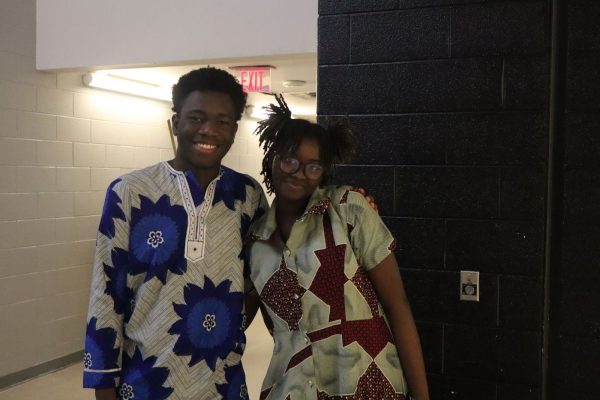
Like Howard, Black History Month is a very important period for Ejiogu. “Black history is about recognizing the struggles of our predecessors, because we did go through a lot, and we continue to go through the same things today,” he said. “Sort of recognizing the patterns of history and seeing what we can do to improve as a people, because we still have a lot of progress to make. For me, it’s just about growth.”
Senior Aidan Rogers, social media manager of BSU, joined the association this year. “I do all the posts, I edit them myself, I write all the captions. My goal is just to try to get as many people to come out as possible,” he said. “I recorded behind the scenes promotional stuff for spirit week and… anytime you see a photograph or post, the majority of the time it’s me.”
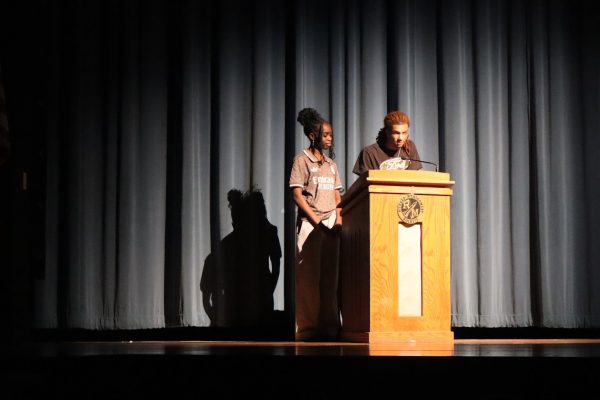
Because his mother works in the military, Rogers has lived all over the country. They’ve moved from North Carolina, to PG County, to Colorado, until they finally arrived here Montgomery County in 2023. “I’ve been all over the place in the States, and I’ve met all kinds of people, but I love it here,” he said. “This is the largest Black community I’ve been in in school… This Black culture here shines.”
During the evening, Rogers also helped introduce some of the performances and was also involved in the planning. “It’s our biggest event of the year. It kind of all leads up to this. We have more stuff planned. We have field trips, we have our other events and spirit week, we have going on, but this was the biggest thing, and I think this is the thing that we’re most proud of,” he said. “The goal is to show how creative the black community at this school is.”
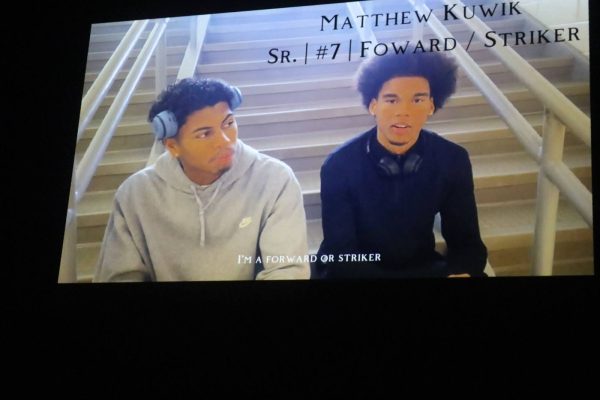
In addition, he produced a short film featuring two student athletes that was played for the audience at the end. “I want to try to show how creative I am. I have a lot of ideas, a lot of things that I want to do that I think people haven’t done before,” he said. “People have done documentaries before, but how many times do you get to see a two-person documentary of two excellent student athletes at a school and what goes on in their mind?”
Rogers has been a film enthusiast his whole time and he says taking the IB film class here at RM helped raise his skills to another level. “I absolutely recommend it to anybody that has any remote interest in film, because, honestly, it made me even more into film than I already was,” he said. “Film is my entire life. And so if I do ever want to become a real filmmaker, I would love to incorporate my identity, my culture, and my people.”
One of his biggest inspirations is the Black filmmaker Spike Lee. “I think being Black opens you up to more opportunities and more ideas of what you can do,” he said. “You see the world differently being Black and being able to put it on film, being able to talk about your ideas and the way that you view the world is very important and very special.”


